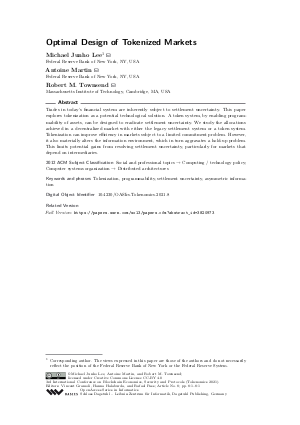Optimal Design of Tokenized Markets
Authors Michael Junho Lee, Antoine Martin, Robert M. Townsend
-
Part of:
Volume:
3rd International Conference on Blockchain Economics, Security and Protocols (Tokenomics 2021)
Part of: Series: Open Access Series in Informatics (OASIcs)
Part of: Conference: International Conference on Blockchain Economics, Security and Protocols (Tokenomics) - License:
 Creative Commons Attribution 4.0 International license
Creative Commons Attribution 4.0 International license
- Publication Date: 2022-03-18
File

PDF
OASIcs.Tokenomics.2021.8.pdf
- Filesize: 265 kB
- 1 pages
Document Identifiers
Related Versions
Subject Classification
ACM Subject Classification
- Social and professional topics → Computing / technology policy
- Computer systems organization → Distributed architectures
Keywords
- Tokenization
- programmability
- settlement uncertainty
- asymmetric information
Metrics
- Access Statistics
-
Total Accesses (updated on a weekly basis)
0Document
0Metadata
Abstract
Trades in today’s financial system are inherently subject to settlement uncertainty. This paper explores tokenization as a potential technological solution. A token system, by enabling programmability of assets, can be designed to eradicate settlement uncertainty. We study the allocations achieved in a decentralized market with either the legacy settlement system or a token system. Tokenization can improve efficiency in markets subject to a limited commitment problem. However, it also materially alters the information environment, which in turn aggravates a hold-up problem. This limits potential gains from resolving settlement uncertainty, particularly for markets that depend on intermediaries.
Cite As Get BibTex
Michael Junho Lee, Antoine Martin, and Robert M. Townsend. Optimal Design of Tokenized Markets. In 3rd International Conference on Blockchain Economics, Security and Protocols (Tokenomics 2021). Open Access Series in Informatics (OASIcs), Volume 97, p. 8:1, Schloss Dagstuhl – Leibniz-Zentrum für Informatik (2022)
https://doi.org/10.4230/OASIcs.Tokenomics.2021.8
BibTex
@InProceedings{lee_et_al:OASIcs.Tokenomics.2021.8,
author = {Lee, Michael Junho and Martin, Antoine and Townsend, Robert M.},
title = {{Optimal Design of Tokenized Markets}},
booktitle = {3rd International Conference on Blockchain Economics, Security and Protocols (Tokenomics 2021)},
pages = {8:1--8:1},
series = {Open Access Series in Informatics (OASIcs)},
ISBN = {978-3-95977-220-4},
ISSN = {2190-6807},
year = {2022},
volume = {97},
editor = {Gramoli, Vincent and Halaburda, Hanna and Pass, Rafael},
publisher = {Schloss Dagstuhl -- Leibniz-Zentrum f{\"u}r Informatik},
address = {Dagstuhl, Germany},
URL = {https://drops.dagstuhl.de/entities/document/10.4230/OASIcs.Tokenomics.2021.8},
URN = {urn:nbn:de:0030-drops-159051},
doi = {10.4230/OASIcs.Tokenomics.2021.8},
annote = {Keywords: Tokenization, programmability, settlement uncertainty, asymmetric information}
}
